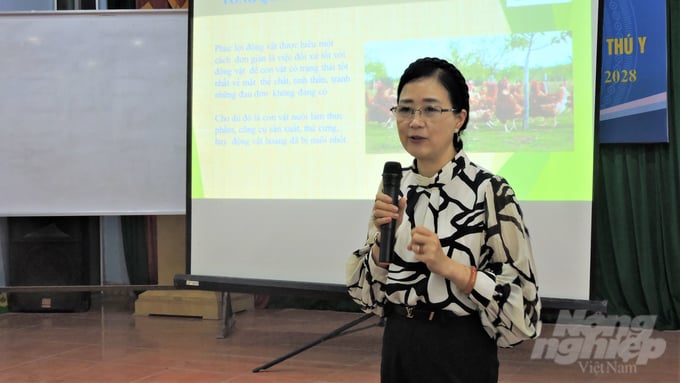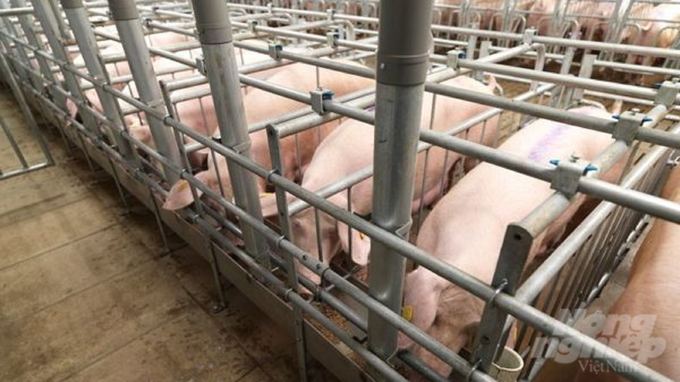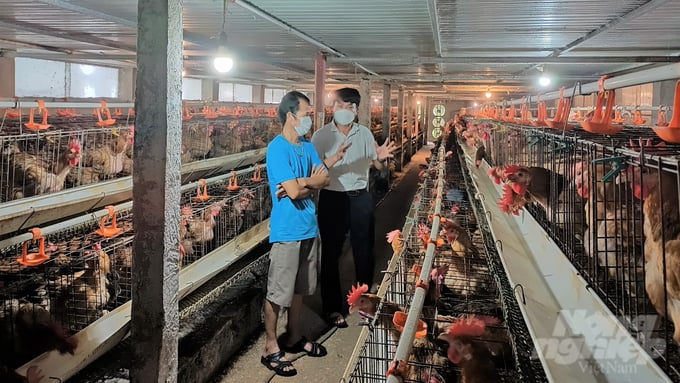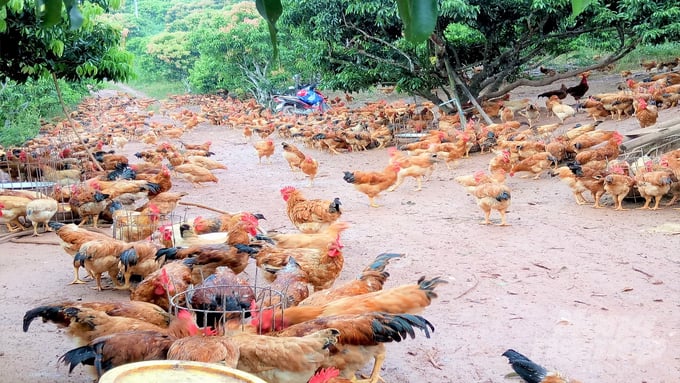May 31, 2025 | 00:13 GMT +7
May 31, 2025 | 00:13 GMT +7
Hotline: 0913.378.918
May 31, 2025 | 00:13 GMT +7
Hotline: 0913.378.918
According to Dr. Ha Thuy Hanh, Vice President of the Vietnam Animal Welfare Association, animal welfare or animal rights, is a term that refers to the good physical and mental state of an animal.
Additionally, it refers to the treatment of animals to maintain their health and prevent needless suffering, regardless of whether they are raised for food, as a tool for production, as a pet, as a captive wild animal, or for slaughter.
Animal welfare has been practiced in the United Kingdom since 1822 and the concept gained global recognition after the 1960s. The term animal welfare also means human concern for animal rights or for the ethical treatment of animals. They are measured by our attitudes towards the use of animals.
There are five criteria to ensure animal welfare: no hunger; free from physical and mental discomfort; free from pain, injury or disease; free from fear and anxiety; and free to express instinctive behaviors.

Dr. Ha Thuy Hanh, Vice President of the Vietnam Animal Welfare Association. Photo: Toan Nguyen.
Animal welfare has a significant impact on human life, so it requires sustainable development, especially in countries that rely on agriculture.
Improving animal welfare standards will not only benefit animals, but also positively impact food security, public health and biodiversity.
Animals, humans and the natural environment have an interconnected relationship. As a result, protecting animal welfare also means protecting the environment, biodiversity resources and society. Additionally, animal welfare directly affects our source of food, livelihood, and means of production among many other factors.
Animals in Vietnam are primarily considered a source of food, so animal welfare remains a foreign concept. Foreign tourists are often intimidated by the rampant slaughter of dogs and cats as well as the sight of animal slaughter in the middle of the market or on the roadside in Vietnam. As a result, the image of a friendly and hospitable Vietnam is badly damaged.

Animal welfare is a foreign concept to the majority of Vietnamese farmers. Photo: Hoang Anh.
The protection of animals in Vietnam has made remarkable changes over the years, especially among the younger generations who are increasingly active in animal and wildlife protection activities.
However, animal-loving groups in Vietnam are limited to family pets such as dogs, cats, birds, etc. Common livestock species in economic development such as chickens, ducks, pigs, goats, buffaloes, cows, horses, etc. have not received enough attention.
According to Dr. Cu Thi Thien Thu from Vietnam National University of Agriculture, Vietnam firmly holds its position as one of the top ten pork producing countries in the world. However, the export of Vietnamese pork products faces numerous challenges due to limited traceability and biosecurity, and higher prices compared to the average level of other countries around the world. Most importantly, livestock production facilities in Vietnam fail to meet animal welfare criteria.
According to the latest data from the General Statistics Office in June 2023, poultry production in Vietnam reached over 545 million heads in 2022.
The leading provinces and cities in Vietnam in terms of poultry production include Hanoi city with nearly 35 million chickens, Nghe An province with over 32 million, Thanh Hoa province with over 25 million, and Dong Nai province with over 24 million.
There are currently 88 million egg-laying hens nationwide, which are primarily kept in cramped, multi-floor cages. Due to the extreme density, the hens can be suffocated and die in large numbers in the event of a brief power outage.
Dr. Dang Thi Thanh Son from the Institute of Animal Health emphasized the severity of animal welfare issues in poultry production. Firstly, chickens raised in compliance with animal welfare standards will develop more quickly and create more beneficial nutrients for human consumption.

Vietnam firmly holds its position as one of the top ten pork producing countries in the world. However, the export of Vietnamese pork products faces challenges due to a variety of factors. Photo: Hoang Anh.
Secondly, many food businesses around the world are against the consumption of eggs produced from cramped cages.
This policy is also being applied in Vietnam with the participation of over 30 multinational businesses. Consequently, consumers and major businesses are increasingly aware of social welfare issues.
Bac Giang is a leading province in Vietnam in terms of chicken and pig production. Accordingly, the province has approximately 156,500 livestock establishments, divided into 2 categories, with over 154,000 households and over 2,200 farms.
In terms of production scale, the province has 1,800 small farms, 339 medium farms, and 58 large farms. The province maintains a pig herd of at least 910,000 heads and a poultry herd of 20 million heads with 17 million chickens. Additionally, the province can produce over 250,000 tons of meat every year.
The province currently has 98 livestock cooperatives; with six VietGAP-compliant breeding facilities, 102 certified disease-free breeding facilities, and 1 certified disease-free chicken production area.
Livestock production in Bac Giang province is experiencing a strong shift towards the reduction of small-scale livestock production, gradually increasing farm-scale livestock production. Moreover, the local livestock industry has focused on chain-linked production in combination with the application of scientific and technological advances.
Similar to other localities across Vietnam, animal welfare is a foreign concept to the people of Bac Giang province. This issue has also been addressed in the Law on Livestock Production and the Law on Animal Health.

A chicken farm in Bac Giang province. Photo: Toan Nguyen.
According to Mr. Le Van Duong, Head of Bac Giang province's Sub-Department of Livestock Production and Animal Health, livestock production in Bac Giang province is increasingly advanced, modernized and industrialized. Conversely, modern production also gradually limits the growth, development and alters the normal behavior of each animal species.
Humane treatment of animals or ensuring animal welfare is essential. It not only helps ensure the right to humane treatment of livestock, but it is also a prerequisite for local livestock products to reach the global market.
Consequently, Bac Giang province's Sub-Department of Livestock Production and Animal Health has coordinated with the Vietnam Animal Welfare Association to organize a training program, with trainers who are leading experts in Vietnam to educate livestock producers and animal health staff on animal welfare.

Yen The hill chicken in Bac Giang province. Photo: Toan Nguyen.
Mr. Duong expects the training program to provide knowledge on animal welfare to professional managers at provincial and district levels. On the other hand, the program will train a generation of professional and expert staff to promote humane treatment and animal welfare in livestock production to every livestock household in Bac Giang province.
Bac Giang province has a high number of local businesses, cooperatives and livestock establishments. Most notably, Yen The district has recognized as a disease-free production area.
Several chicken and pig farms owned by Hai Thinh Nutrition Joint Stock Company are the pioneers in registering for certification of farm animal welfare. Experts from HSI have visited these farms to consult on the registration, survey the farm to submit results to Humane Certify - an international certification organization.
Translated by Nguyen Hai Long

(VAN) Several scientists and farmers are experimenting with soil treatment in some key durian-growing regions such as Cai Lay (Tien Giang), Dak Song, Gia Nghia, and Dak R’lap (Dak Nong).
/2025/05/25/4127-3-073637_820.jpg)
(VAN) Thanks to the promotion from an FAO-implemented project, vegetable production in greenhouses in Moc Chau has seen strong development, from 1.5 hectares in 2021 to nearly 50 hectares in 2024.

(VAN) FAO has recently supported USD 140,000 to implement the project 'Risk mitigation human-animal interface risks through disease control initiatives in pig farming.'

(VAN) The People's Committee of Tra Vinh province has approved an adjustment to the investment policy for the Green Hydrogen Plant project, increasing its area to approximately 52.76 hectares.
![Reducing emissions from rice fields: [2] Farmers’ commitment to the soil](https://t.ex-cdn.com/nongnghiepmoitruong.vn/608w/files/news/2025/05/05/dsc08881jpg-nongnghiep-140632.jpg)
(VAN) Clean rice cultivation model in Thuong Tan commune, Bac Tan Uyen district, is assisting local residents in achieving sustainable agriculture by substantially reducing costs, increasing productivity, and protecting the environment.

(VAN) At the conference to disseminate Resolution No. 68, AgriS introduced its digital agricultural ecosystem and reaffirmed its commitment to accompanying the Government in promoting private sector development and sustainable agriculture.

(VAN) 'Blue Ocean - Blue Foods' initiative is designed to restore marine ecosystems and establish sustainable livelihoods for local communities by cultivating a minimum of 1,000 hectares of cottonii seaweed in the first three years.